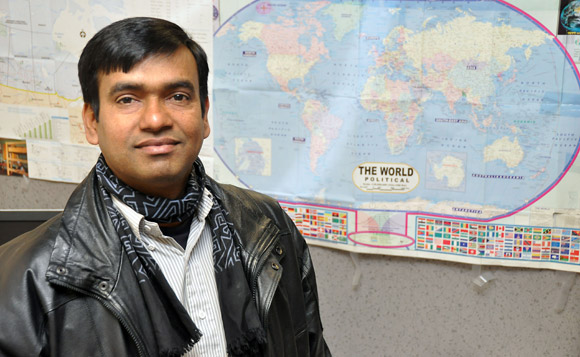
Anwar Hossen, a PhD candidate at UBC's Okanagan campus, has received the 2010 Jawaharlal Nehru Humanitarian Award. The award is given each year by the Centre for India and South Asia Research, part of the Institute for Asian Research at UBC's Vancouver campus.
The Centre for India and South Asia Research has awarded the 2010 Nehru Humanitarian Award to UBC Okanagan doctoral student M. Anwar Hossen, for his research into water policy and governance in rural Bangladesh.
This award is given annually to the UBC master’s degree or PhD student with the most promising research on a topic related to South Asia.
“This award is very significant for Anwar,” says John Wagner, assistant professor of anthropology in the Community, Culture and Global Studies Unit, and Hossen’s supervisor. “All UBC graduate students from either campus who are working on any topic related to South Asia, regardless of discipline, are eligible to apply for the award. That Anwar was selected highlights the importance of the research he is doing and recognizes the dedication he brings to his work.”
Wagner and Hossen share an interest in how political decisions create winners and losers. In this case, the biggest losers are the rural people who reside in the Ganges-Brahmaputra Basin area in Bangladesh – the focus of Hossen’s research and also the area where he grew up.
Hossen asserts that water is a human right that should be recognized and protected by governments and decision makers.
“If you have no access to water, than many other recognized human rights are also violated,” says Hossen. “Without water, people’s livelihoods are disrupted. They cannot grow food, and often become displaced, which means they also cannot access shelter, education or healthcare.”
The Ganges-Brahmaputra Basin encompasses several different countries including, China, India, Nepal, Bhutan and Bangladesh. Eighty per cent of Bangladesh lies in the flood plain, which means that decisions to alter and use water in surrounding countries affect the amount of water flowing into Bangladesh. This creates regular alternating floods and water shortages. Added to these ecological disasters are the human effects of displaced people and border violence.
Hossen believes that for an effective water policy to be created and adopted, all bordering countries need to work together.
“These countries are not all equal,” says Hossen. “Some have more power than others, but social and environmental problems are not bound by borders, so it is in the best interest of all affected countries to create a governance practice that protects the water rights of people who depend on them.”
Hossen’s research has included analysing government documents, legislation and international agreements, as well as studying archival and statistical information.
This spring, he will head to South Asia to conduct field research in the rural community of Shakrail, Bangladesh. He hopes his work will improve policy and governance for the Ganges and Brahmaputra rivers and lead to a more stable basin community.
— 30 —